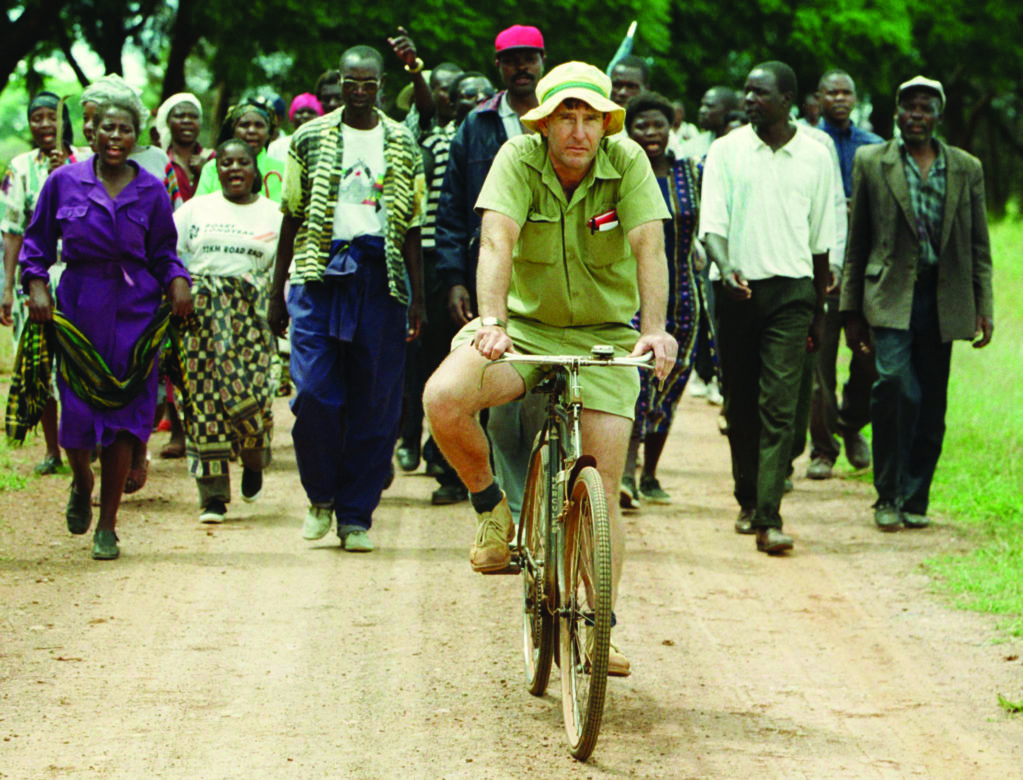This is the story behind a picture that flashed around the world during the infamous land seizures in Zimbabwe in 2000. It won then-Reuters photojournalist, Howard Burditt, an award but the picture did not tell the implied story of a farm invasion.
“They asked me to lead them to the farmhouse adjacent to the dam, so I cycled while they followed behind on foot.”
“I thought they had come to take over my farm, but not that day, they were looking for accommodation,” says Tommy Bayley, the farmer on the bike.
“They were not violent and when I took them to the house located close to the dam, they saw it was not the right place to sleep over, so they left,” he adds.
It would take two years for Bayley to lose his father’s farm, 30 kilometers from Harare; where he was born.
Loading...
Bayley tells his story cautiously, saying the farming world of Zimbabwe is not for the faint hearted nor outspoken.

“I live a simple life and I would not want to draw attention,” he says while casting his mind back to the day the Bayleys lost their farm.
“We went to town and when we returned, they had barricaded the road so we could not get back to Danbury Farm, Mazowe area. This was 14th April, 2002,” Bayley recalls.
“We did not have a total loss of equipment but there was some looting of the equipment.”
For over half a century, the Bayley family owned Danbury, a farm set in the mountain which had 350 hectares of seed maize, soya beans and cattle.
Its loss was tragic for the Bayleys – one of the most successful families in Zimbabwe.
His father, Tom Bayley, an 88-year-old British-born farmer, died in misery. Bayley senior was under siege by land invaders for 35 days during which he broke his leg. He “died of a broken heart”, the family claimed at his funeral.
Bayley says Danbury is a shadow of itself.
“The production is getting less each year. The new farmers do not have inputs; I estimate that there is about 10 percent production,” he says.
“The gates and fence are gone at the farm that used to employ about 100 permanent workers.”
The Zimbabwe government has hinted the country could be backtracking on its chaotic land reform program that began in 2000.
The country’s land minister, Douglas Mombeshora, was reported in the state media to have told provincial leaders to come up with names of white farmers they wanted to remain on their farms. The minister is reported to have said the farms should be “of strategic economic importance”.
The director of Zimbabwe’s Commercial Farmers’ Union, Hendrik Olivier, says his organization is unaware of any reversal of the land reform.
At its peak in 1997, the agriculture sector employed more than 500,000 people, contributing 30% of the gross domestic product (GDP). Since 2000, Zimbabwe has seen production of maize declining by 79%, wheat by 90%, soya beans 66%, citrus 50%, fresh produce 61%, dairy 59%, beef 67%, coffee 92% and tea 40%.
So could Bayley, the farmer on the bike, return to farming if his name appeared on a list?
Despite the loss, Bayley says he would go back, if the government allowed him, but warns that financing would be one of the hurdles.
“You can’t borrow everything from inputs to farming equipment. Farming is a business. I am still young enough to get back into farming,” he says.
After a couple of minutes of our telephone conversation, I have to let him go back to work in Harare. His last words are: “Life is too short. I am trying to enjoy the life I have.”
Loading...
